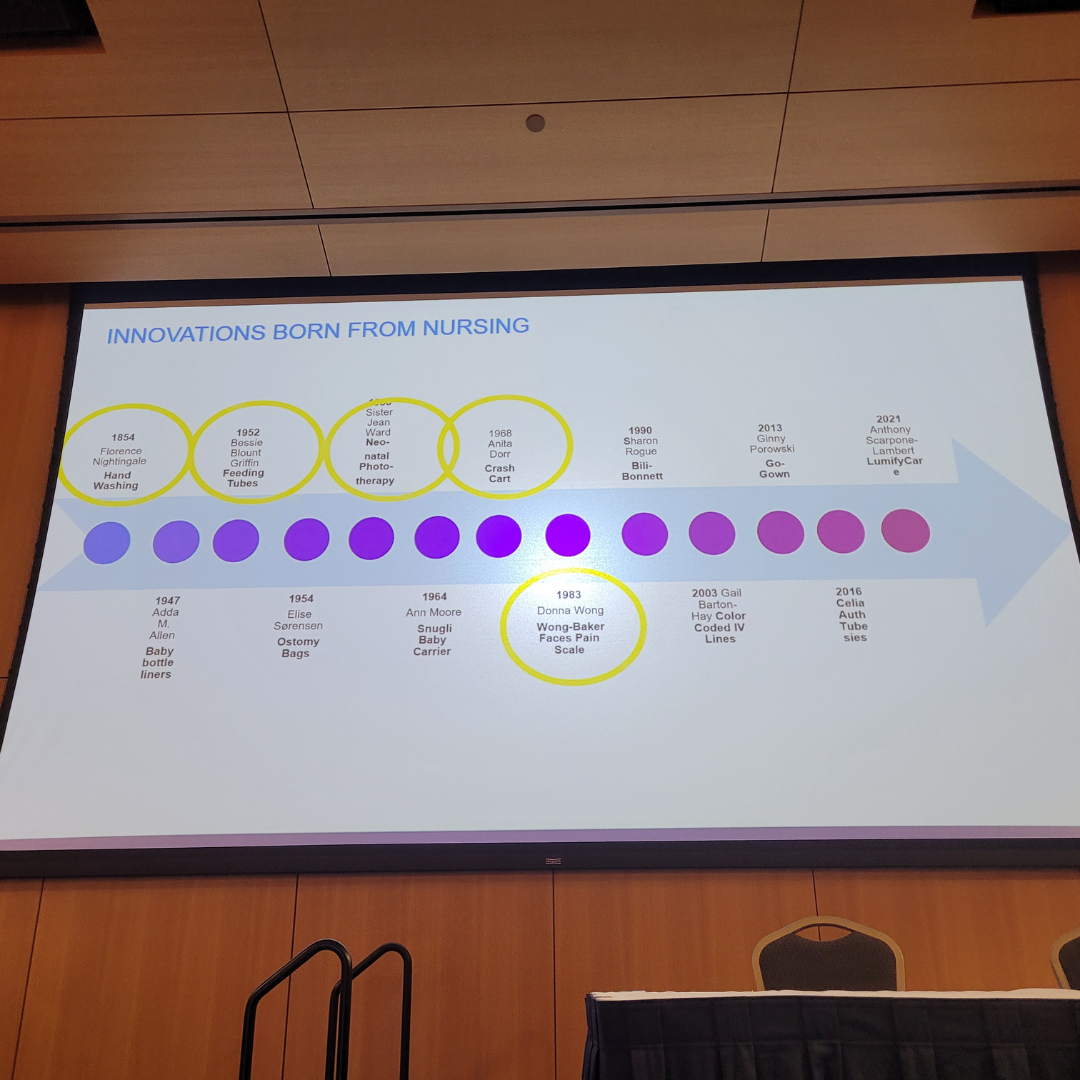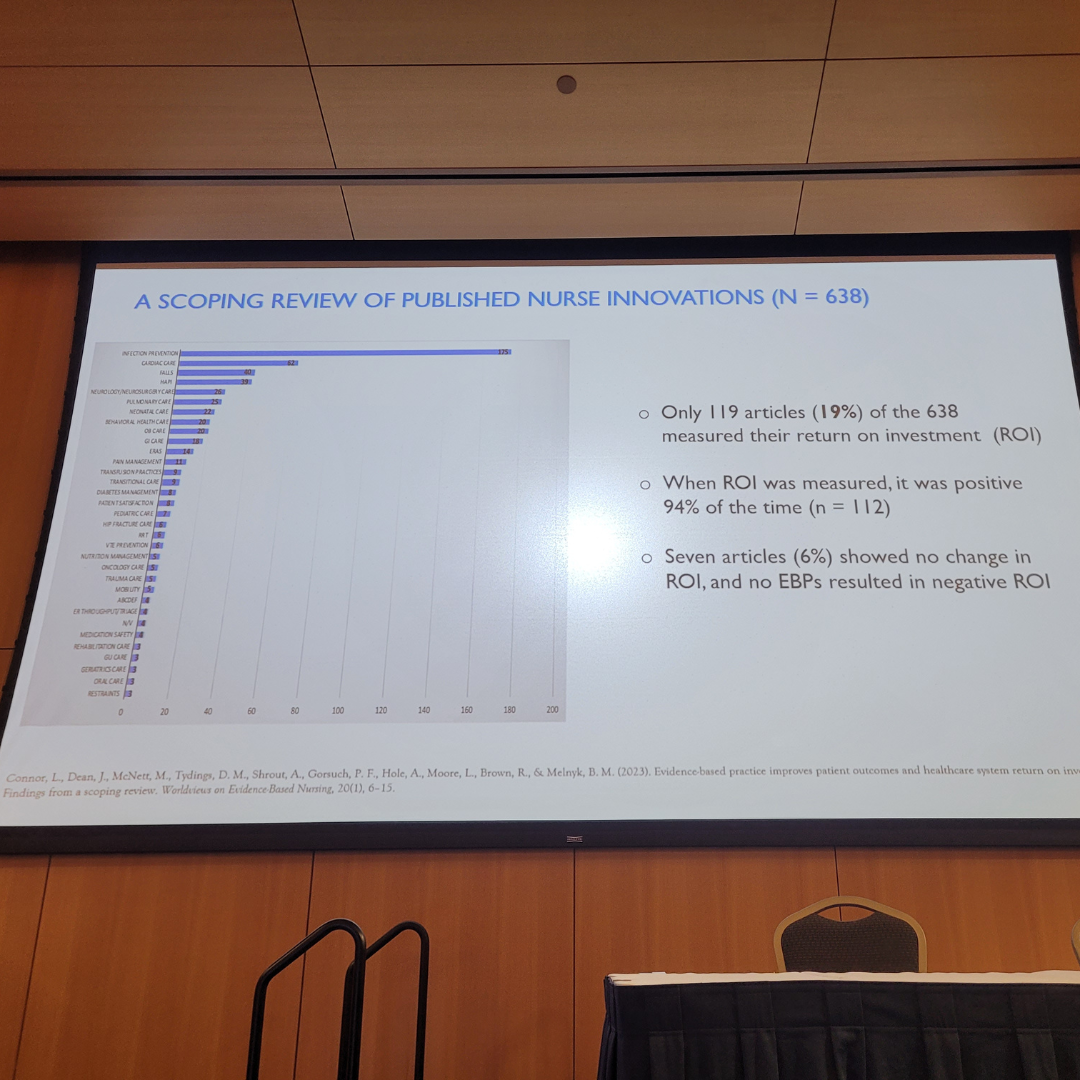📸 Pictured: Dr. Kimberly Souffront and me at the Third Annual Nursing Reignited Symposium, Houston, Texas.
DNP or PhD?
Nearly twenty years ago, I chose to pursue a dual DNP-PhD degree.
After graduating from the University of Memphis, I sat down with two professors, one with a PhD, one with a DNP, and asked them to offer their advice. But then, after my first two years working as a nurse at Georgetown University Hospital and deciding I didn't want to dedicate that much time to academia again, I knew I had to pick one. I deliberately took another year to finally choose.
I chose the DNP because I wanted to practice, participate in research, and teach. But here's what no one told me: I didn't have to choose between generating knowledge and translating it. I just didn't know that path existed.
It wasn't until last year, during my first interview with Dr. Kimberly Souffront, PhD, RN, FNP-BC, FAAN, on The Melanin Initiative Podcast, that I learned nurse practitioners could see patients AND conduct research as PhD-prepared nurse scientists. For the first time, I understood that the conversation didn't have to be framed as "one or the other."

On November 13, 2025, I had the honor of meeting Dr. Souffront in person here in Houston at the Third Annual Nursing Reignited Symposium: The Evolution and Future of Nursing Science 2025: The Evidence Is in the Room: Reframing Nursing Practice as the Foundation of Scientific Change. And it reminded me why this work matters so much.
Since graduating from my BSN-DNP program, I've loved translating the latest evidence into practice knowledge and action steps that nurse practitioners can use to care for patients and build their businesses. That's exactly what it means to be a DNP-trained NP. As a biology and biomedical engineering graduate, my thirst for the lab, for research, and for dissemination has never gone away. It's why I founded Mahogany Dermatology Nursing | Education | Research™ in the first place.
What I've learned along the way is that DNP and PhD nurses are meant to work together. I first saw this modeled at Georgetown University when Dr. Danielle McCamey, DNP, ACNP-BC, FAAN, FAANP, FCCP, FADLN, founded a collaborative group of PhD and DNP nurses doing exactly that. I joined the group. Then, I joined a small social media platform called DNPs of Color, which would later become the first and only professional nursing membership dedicated to increasing the number of doctorally prepared nurses, where I became one of the first 500 paying members—and one of the first to renew my membership. (It's that time again. Let's go for year three.)

For the last year, I've been on a not-so-silent mission to work with PhD-trained nurses to carry out our work at Mahogany Dermatology Nursing | Education | Research™: increase access to dermatology nursing education with an emphasis on skin of color, business acumen, and digital fluency. I've been blessed to find partners in each of these areas, a beautiful testament to the power of staying consistent and persistent.
And the mission of the degree has manifested:
- Nearly 200 published articles
- Publications including Nursing Aesthetics: An Introductory Guide for Nurse Practitioners & Entrepreneurs, The State of Nursing Education: Pathways, Purpose, and the Future of Cosmetic & Dermatology Practice 2025 Whitepaper, and multiple digital resources
- Advising doctoral students in and outside of nursing, within and beyond dermatology
- Founding the Alliance of Cosmetic Nurse Practitioners™, where we translate evidence and proven strategies for NPs who specialize in cosmetics and entrepreneurship
- Co-hosting The Melanin Initiative Podcast, where we show how nurses implement evidence-based practice, translate new knowledge for patients, inspire aspiring professionals, and teach our peers how to leverage their expertise as entrepreneurs and clinicians
Now, we're setting our footprint in some of the greatest journals in nursing, dermatology, and translational science.
Every time I get to see, talk to, or work with a nurse scientist, it brings me nothing but pure delight. We serve two very important roles when it comes to education, research, and healthcare. The DNP degree was created to close the 17-year gap between when new knowledge is generated by nurse scientists like Dr. Souffront and when it's actually implemented by DNP-trained NPs like Dr. Mariam Rabiu, DNP, FNP-BC, and Dr. Ofonime Bleess, DNP, MBA, FNP-BC, ENP-C, from dermatology to the emergency department and the boardroom.
I'm happy to find myself in the middle.

During her talk, Dr. Souffront was asked to motivate nurses to see themselves as problem solvers. She reminded everyone they didn't have to look far for problems or solutions because the evidence is already in the room. We were encouraged to participate in innovation, using our nursing expertise as the only validating credential needed.
I left being inspired to add the ROI to my research and to think about the greater impact of the stories we can tell and problems we can solve when we develop longitudinal studies and collect data over a long period of time.
To Dr. Souffront: Thank you for saying yes the first time I invited you on The Melanin Initiative Podcast, and for saying yes every time since. Your insight and passion from more than two decades as a thought leader, founder, nurse scientist, practitioner, professor, and mentor have shaped not just my understanding of what's possible, but my conviction about what's necessary. Your dedication to our profession and community is what history books are composed of. I'm grateful to be part of yours.
About Dr. Kimberly Souffront
Dr. Kimberly Souffront, PhD, RN, FNP-BC, FAAN, is an Associate Professor of Emergency Medicine and Associate Director of the Center for Nursing Research & Innovation at Icahn School of Medicine at Mount Sinai. As a Fellow of the American Academy of Nursing, her research focuses on health equity, asymptomatic high blood pressure in emergency department settings, and nurse-led translational science, work that directly addresses health disparities in underserved populations.
Beyond her clinical and academic roles, Dr. Souffront is the founder of The Souffront Institute, an incubator dedicated to nurse-scientist development and mentorship programs. She is also the founder and Editor-in-Chief of Practical Implementation of Nursing Science (PINS), a journal dedicated to bridging the gap between research and practice. Through these initiatives, she builds the infrastructure that transforms nurse practitioners into nurse scientists, equipping them with the tools, networks, and confidence to generate new knowledge that shapes healthcare policy and practice.
Dr. Souffront's career exemplifies what it means to refuse the false choice between practice and research. As a board-certified family nurse practitioner, she maintains clinical practice while leading groundbreaking research initiatives and mentoring the next generation of nurse scientists. Her work demonstrates that nurse practitioners don't have to choose between seeing patients and generating evidence; they can do both, and healthcare is stronger when they do.
If you're a DNP or PhD-prepared nurse with a passion for implementation science, translational research, or evidence-based practice and you're interested in contributing to the peer review process for PINS, this is a rare opportunity to shape the future of nursing science alongside one of the field's most visionary leaders. Reach out to Dr. Souffront or myself to learn more about joining the editorial review team.
Her dedication to closing the gap between knowledge generation and clinical implementation, combined with her commitment to addressing health disparities, makes her a thought leader in nursing science and a model for what collaborative, equity-driven healthcare research can achieve.
About the Author
Dr. Kimberly Madison, DNP, AGPCNP-BC, WCC, is a Board-Certified, Doctorally-prepared Nurse Practitioner, educator, and author dedicated to advancing dermatology nursing education and research with an emphasis on skin of color. As the founder of Mahogany Dermatology Nursing | Education | Research™ and the Alliance of Cosmetic Nurse Practitioners™, she expands access to dermatology research, business acumen, and innovation while also leading professional groups and mentoring clinicians. Through her engaging and informative social media content and peer-reviewed research, Dr. Madison empowers nurses and healthcare professionals to excel in dermatology and improve patient care.